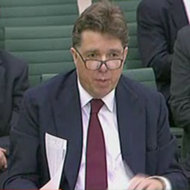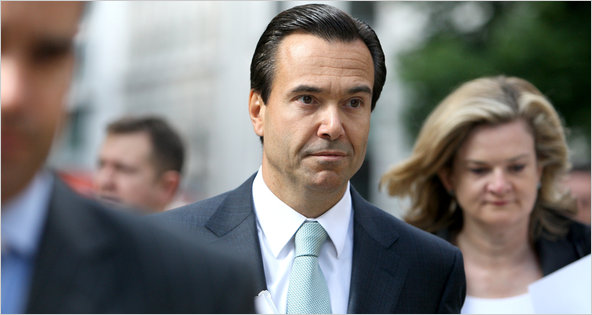3:53 p.m. | Updated
 BBCPaul Tucker, a Bank of England official, testified before a British parliamentary committee on Monday.
BBCPaul Tucker, a Bank of England official, testified before a British parliamentary committee on Monday.
LONDON – Under sharp questioning by political leaders on Monday, Paul Tucker, the deputy governor of the Bank of England, defended the central bank in light of the interest rate manipulation scandal that has engulfed Barclays.
Mr. Tucker rebutted allegations by Barclays’ officials that the central bank was well aware of the manipulation of rates and did nothing to stop it.
Robert E. Diamond Jr., the former chief executive of Barclays, resigned because of the scandal and told the same committee last week that senior government officials had been repeatedly told about efforts to influence key interest rates but did nothing to intervene.
Mr. Tucker testified that while senior officials had maintained regular contact with senior managers at Barclays after the collapse of Lehman Brothers in 2008, he was not informed of the effort to manipulate the London interbank offered rate, or Libor. The rate is used as a benchmark for trillions of dollars of corporate loans, home mortgages and derivatives around the world.
“I was not aware of allegations of lawbreaking until the last few weeks,” Mr. Tucker said during more than two hours of questioning.
Mr. Tucker, who is a front-runner to replace Mervyn A. King as the head of Britain’s central bank next year, appeared confident in the initial part of his testimony, but became increasingly anxious as politicians queried him on his role in the scandal.
He added that the Bank of England had continued to use the rate to underpin its multibillion-dollar credit facilities for local banks throughout the financial crisis. The British government lent firms more than $310 billion as part of its so-called Special Liquidity Scheme from 2008 to 2011.
Despite the Bank of England’s actions, British politicians criticized Mr. Tucker for not taking a more active role in policing. When asked by politicians whether he was confident that the Libor manipulation had now stopped, Mr. Tucker wavered.
“I can’t be confident about anything after learning about this cesspit,” he replied.
Barclays agreed in late June to pay about $450 million to settle accusations from United States and British authorities that its traders and senior executives had manipulated the rate.
Amid concerns that senior officials may have directed Barclays to alter its Libor submissions, British politicians on Monday focused their questioning on a conversation Mr. Tucker had with Mr. Diamond at the end of October 2008.
In his testimony, Mr. Tucker said the worries from authorities were linked to fears that the financial markets might perceive Barclays to be at risk if its Libor submissions continued to be higher than those of other international banks.
The British official said his phone call to Mr. Diamond was to remind the Barclays chief that people in the markets were questioning whether the British bank had access to financing.
“I wanted to make sure that Barclays’ day-to-day funding issues didn’t push it over the cliff,” Mr. Tucker said.
E-mails released by the Bank of England before Mr. Tucker’s testimony revealed that senior British officials were worried about banks’ access to the financial markets in the aftermath of the collapse of Lehman Brothers.
“We are [very] concerned that U.S. rates are tumbling but we remain stuck,” Jeremy Heywood, a senior British civil servant, told Mr. Tucker in an e-mail on Oct. 22, 2008.
Mr. Tucker also was in almost daily contact with senior Barclays executives during the final weeks of October, 2008, according to the documents.
“These were completely extraordinary times,” Mr. Tucker said. “Two banks had been taken under the government’s wing, so Barclays was next in line.” During that period, the British government provided multibillion-dollar bailouts for Royal Bank of Scotland and Lloyds Banking Group.
He contacted Mr. Diamond on Oct. 25, 2008, saying he was “struck” that Barclays was paying a high interest rate on its loans, even though they were backed by British government guarantees. Mr. Tucker also asked to meet Mr. Diamond to discuss the financing issues.
A few days later, Mr. Diamond sent a separate e-mail to the Bank of England deputy governor with details of a 3 billion euro ($3.7 billion) bond that Barclays had issued, in an effort to quell officials’ fears that the British bank was having financing problems.
“Investor confidence is slowly (very slowly) returning,” Mr. Diamond wrote on Oct. 30, 2008.
The European Commission also waded into the fray on Monday after Michel Barnier, the financial services commissioner, said he would propose amendments to draft market abuse legislation that would outlaw the manipulation of Libor and other benchmark rates.
Mr. Tucker’s testimony was seen as being pivotal to his future career path. Mr. Tucker, 54, has been with the Bank of England for more than 30 years.
After working briefly at the British bank Baring Brothers and with the Hong Kong government in the 1980s, Mr. Tucker rose inside the Bank of England to become the central bank’s deputy governor in charge of financial stability in 2009.
He also is a leading figure in global efforts to overhaul financial regulation, holding senior positions at both the Financial Stability Board and the Global Economy Meeting, whose memberships comprise officials from the world’s leading central banks.
Mr. Tucker is known for his practical knowledge of the financial markets as well as for a track record of backing extra support to finance British banks during the recent economic crisis, according to several of his current and former colleagues, who spoke on the condition of anonymity.
Yet the Libor scandal has hurt Mr. Tucker’s reputation. Individuals connected to the Bank of England have voiced concerns that he missed signs that rate manipulation was happening.
In November 2007, for example, Mr. Tucker headed a committee meeting at the central bank in which, according to the meeting’s minutes, some officials raised questions that banks were submitting lower Libor rates than what they could obtain from the market, a process called lowballing.
“This doesn’t look good, Mr. Tucker,” Andrew Tyrie, the chairman of the parliamentary committee, said. “In these minutes, we have what appear to any reasonable person as the lowballing of rates.”
Article source: http://dealbook.nytimes.com/2012/07/09/british-official-defends-central-banks-role-in-interest-rate-scandal/?partner=rss&emc=rss
